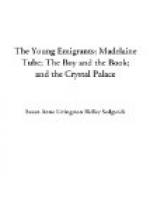We shall have mentioned all our old friends when we add that the baby Willy had become just such another thoughtless daring boy as Tom had been at his age, and that Dick Watson was established in Cincinnati, now called the “Queen of the West,” as a pork merchant, and was getting rich very fast.
The maize, or Indian corn, had attained its ripest hue, and been plucked from the dry stems, which had been deprived of their leaves as soon as the ear was fully formed, that nothing might screen the sun’s hottest rays from the grain, and the golden-colored pumpkins which had been planted between the rows, that no land might be wasted, even left to ripen alone amid the withering corn-stalks. The neighbors from far and near had visited each other’s houses in turn, for the “Husking frolic,” when all joined to strip from the ear the long leaves in which it was wrapped, and which were to be stacked as fodder for the sheep and cattle. The apples had been sliced and dried in the sun, and then strung and suspended in festoons from the kitchen ceiling, the pumpkins had at last been gathered in and stored in great piles in the barn—all provision for winter pies,—and the fall, as the Americans call the autumn, from the falling of the leaf, was drawing to a close when Annie’s wedding-day arrived.
The Watson and the Lee families were so much respected by their neighbors, that when Tom was married, a year before, and now, also, all seemed to think that they could not sufficiently show their good will, unless they overwhelmed them with whatever might be thought most likely to please in the way of dainties. For a day or two before, the bearer of some present might have been seen each hour at the Lees’ door.
“Please, Mrs. Lee, mother sends her compliments, and a pot of first-rate quince preserves,” said one.
“I’ve just run over with some real sweet maple, Mr. Lee,” cried another. “I reckon it’s better sugar than you’ve tasted yet!”
Annie and her mother began to wonder how such an abundance of good things as poured in upon them could ever be disposed of.
Breakfast had scarcely been cleared away on the morning of the appointed day, when Tom and Katie came trotting to the door in their light wagon. They had scarcely alighted when Uncle John arrived, driving up with his wife and children. “Only just ahead of us, Tom!” he cried, as he jumped out, and ran up the steps to kiss Annie. “Bless you, my girl!”
“I am so glad you are all come,” said Annie, with a smiling, blushing face. “Mother is so busy, and wishing so for Aunt Abby and Katie!”
“Aye, they’re two good ones for setting things to rights!” cried Uncle John; “but I say, Annie, we met a party of red ladies and gentlemen coming here.”
“What do you mean, uncle?”
“Why, half a dozen Indians, with their squaws and papooses are on the road, and I told them to stop here, and I would trade with them—so get something for them to eat, will you?”




